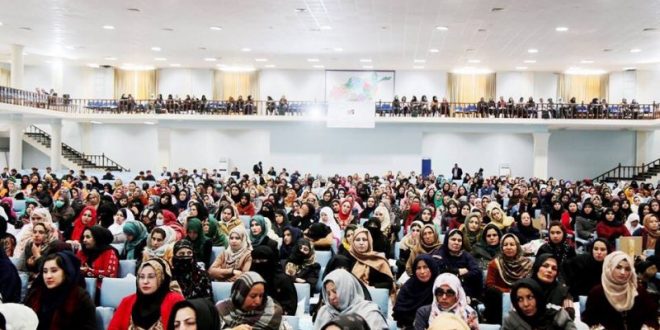More than Just a Seat at the Table
By Lida Nadery Hedayat
While negotiations for peace in Afghanistan represent an important step forward for the country’s future, any dogmatic changes could place Afghan women’s rights at risk. Nascent gains in women’s rights over the past decade and a half are a result of the commitment and struggle of hundreds of Afghan women’s rights activists, and the international community that supported women and civil society groups to protect their rights. However, these hard-won rights are still limited and sustaining them requires constant vigilance.
Afghan women of today are very different from the generations that preceded them. These women understand their rights and they participate in public consultations regarding the decisions that will affect them, their future, and their children. They neither want men to negotiate on their behalf nor to represent them in the political sphere. Afghan women today understand that without a seat at the table, their rights and decisions made about them are at great risk. We are witnessing this today; as peace talks with the Taliban grind on, women continue to be woefully under-represented in every aspect of negotiations.
During the recent peace talks in Doha, the Taliban has stated that they will respect women’s rights as they have always done; they say that they understand that women have the right to education, inheritance, healthcare, work, and business. However, women have not forgotten the Taliban’s past hardline interpretation of these rights that sees a woman’s purpose as running the household. Furthermore, they have actively undermined women’s rights by limiting their freedom, and in many cases denying, their access to formal education.
There is a deep concern among women that when the Government of Afghanistan negotiates a peace agreement with the Taliban, Afghan women will see hard-won gains disappear, their political representation will contract, and many women may lose decision-making positions. There is no guarantee that the Taliban’s views and interpretation of women’s rights have changed, and it is up to the government and those at the negotiating table to safeguard the gains of the past decade
History shows that whenever a peace deal has been negotiated or a regime has changed, the first to suffer are Afghan women. This time can, and must, be different. An enlightened leadership will recognize that no nation can recover from war by leaving half of its population behind. Decades of research unequivocally reveals that where women are directly involved in all aspects of peacebuilding and reconstruction, societies will become more inclusive, democratic, prosperous, and far less likely to slide back into armed conflict or autocracy. As Afghanistan builds its future, Afghan women can and must participate in the peace and reintegration process to play an active role in shaping their country’s future.
As a cornerstone of their engagement, the international community, including the U.S., has been supporting and funding programs for women and gender equality for decades in Afghanistan. This support has resulted in improved opportunities for women’s education and higher numbers of educated women, Afghan women who confidently stand up for their rights and those of their constituents, and women gaining authority and positions to make policy decisions.
This effort continues today. U.S. Secretary of State, Mr. Antony Blinken, stated during his confirmation hearing in the U.S. Senate.
“I don’t believe that any outcome that they might achieve—the Government of Afghanistan and the Taliban—is sustainable without protecting the gains that have been made by women and girls in Afghanistan over the last 20 years. When it comes to access to education, to healthcare, to employment, I think we have a strong interest [if there is an agreement and if it’s going to hold up] to do what we can to make sure those rights are preserved.”
It is critically important that the international community maintains steadfast support for the women of Afghanistan during these peace negotiations, advocating for opportunities for peace and recovery that involve and engage the country’s whole population. After decades of war and conflict, the Afghan people want peace, but that peace has to include and respect everyone’s rights.
Concerns of whether Afghan women’s rights will be protected remain front and center until there is further detail on the peace agreement. Will the government of Afghanistan and the international community stand firm on their commitments to Afghan women and their rights? There is no other option.
The opinions expressed in this article are the author’s own.
 Afghanistan Times
Afghanistan Times




